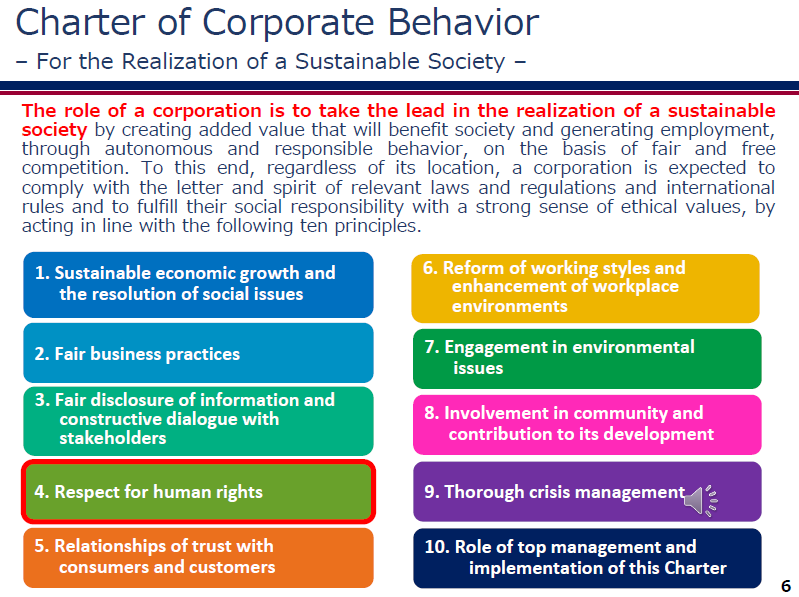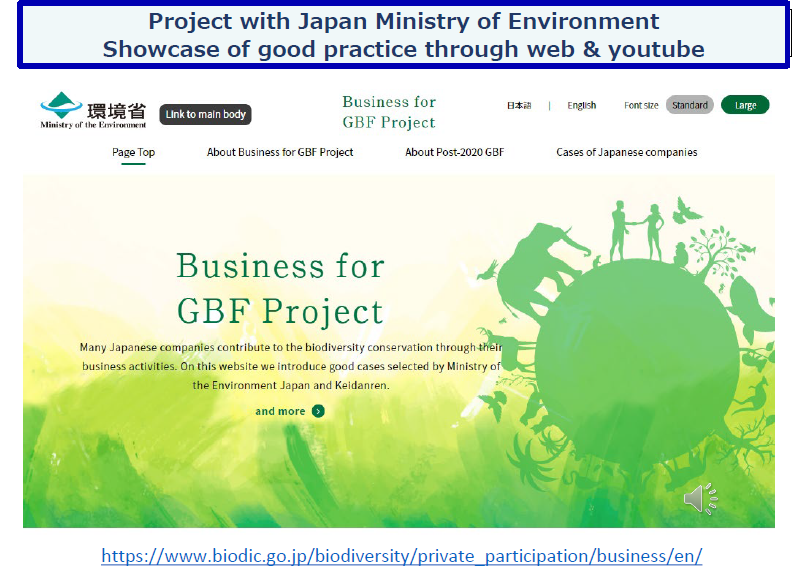At the 18th International CSR Forum held on June 8-9, Masao Seki, Steering Committee Chairman of Council for Better Corporate Citizenship (CBCC), introduced the development of CBCC and shared latest progress of CSR and sustainable development, and current corporate responsibility practices in Japan, focusing on business and human rights and biodiversity conservation.
CBCC was established in 1989 with the support of Keidanren, or Japan Business Federation. With a focus on supporting Japanese companies’ initiatives on sustainability and sustainability management, CBCC places the highest priority on dialogue with a wide range of stakeholders, and works to build and strengthen networks with sustainability organizations both home and abroad.
Since 2003, one of CBCC's main activities is dispatching overseas dialogue missions to better understand global sustainability trends and efforts by leading companies and other stakeholders. CBCC has sent missions to the United States and many countries in Europe and Asia to exchange views and insights with different representatives of international organizations, NGOs, enterprises, investors and other representatives who are committed to promoting sustainable development. It has achieved fruitful results.
With a membership comprising more than 1400 leading Japanese companies, Keidanren is a comprehensive economic organization established in 1946. It compiles views from the business community on key issues faced by businesses in Japan and overseas, and urges governments and international organizations to steadily and swiftly address such issues. Management of sustainability is gaining importance, and CBCC works closely with Keidanren and related organizations to promote initiatives in this field.
Business and Human Rights
For Japan, the primary issue of CSR is business and human rights. To this end, the Japanese government has issued a series of policies.
In 2020, the Japanese government published a "National Action Plan on Business and Human Rights" which was based on the UN Guiding Principles on Business and Human Rights. It clearly stated the government’s expectation that Japanese companies would promote the implementation of human rights due diligence.
In 2022, the government published “Guidelines on Respecting Human Rights in Responsible Supply Chains” to encourage voluntary corporate efforts.
In April 2023, it released Reference Material on Practical Approaches for Companies to Respect Human Rights in Responsible Supply Chains, which includes worksheets and other tools applicable to practical implementation.
More importantly, although Japanese government has not made human rights due diligence mandatory in ways seen in Europe and other countries, companies need to make their own proactive efforts regardless of whether or not this is a legal obligation.
Based on such beliefs, Keidanren has taken the initiative relating to business and human rights ahead of such moves by the government. When revising the Keidanren Charter of Corporate Behavior in 2017, it added a new provision No.4 on respect for human rights to provide member companies with a better understanding of specific practices and regulations for respecting human rights in business practices.

In December 2021, Keidanren further promoted the spread of management that respects human rights by substantially enhancing provisions relating to human rights in the implementation guidance for its Charter of Corporate Behavior and compiling a new practical Handbook for Management that Respects Human Rights. It urged corporates to better understand the UN Guiding Principles on Business and Human Rights and carry out concrete practices. All of these moves were voluntary initiatives that the corporate sector felt were necessary, and were taken in advance of the Japanese government’s steps.
Biodiversity Conservation
Thanks to China's strong leadership, the Kunming-Montreal Global Biodiversity Framework adopted at COP15 in December 2022 is highly significant, since it sets direction for future nature positive initiatives around the world.
As the framework stresses, it is crucial for companies to recognize and identify their dependence and impact on natural capital, and contribute to reversing the downward trend of biodiversity to recovery by 2030.
In 1992, the year of the "Earth Summit". or known as United Nations Conference on Environment and Development (UNCED), Keidanren established its Committee on Nature Conservation (KCNC), to implement the concepts set out in the Keidanren Global Environment Charter. At the same time, it set up the Keidanren Nature Conservation Fund (KNCF).
There are three pillars to KCNC activities.
-
Supporting nature conservation projects run by NGOs through the Fund and working together with those NGOs
-
Raising awareness among companies and supporting them by providing information
-
Making recommendations related to international biodiversity goals and domestic policies, in the aim of establishing environment to encourage corporate biodiversity initiatives
Over the past 30 years, KCNC has supported around 1700 conservation projects run by NGOs around the world through KNCF with funds totaling 4.9 billion Japanese Yen. Nearly 50% of this support went to Asia.
We published the Keidanren Initiative for Biodiversity Conservation in 2020 which was formed by members from Keidanren and KCNC who agreed with “Keidanren Declaration for Biodiversity Conservation” (revised in 2018, originally announced in 2003.)
The Initiative aims to send out information on Japanese business’s efforts for nature conservation domestically and globally. Through the Initiative we are encouraging broader companies to integrate biodiversity into their business and contribute to post-2020 Gloal Biodiversity Framework (GBF).
Member companies from CBCC and Keidanren are actively participating in the Initiative, and are working through their own efforts to better protect biodiversity and the ecological environment in Japan and the world.
In addition, the Business for GBF Project is carried out in partnership with Japan’s Ministry of the Environment has produced videos and a website to enhance showcasing Japanese companies’ biodiversity conservation efforts, especially good examples of projects that use technology to contribute to the GBF.

In recent years, Keidanren has participated in international policy discussions such as the Taskforce on Nature-related Financial Disclosures, or TNFD. Also, we had a dialogue with Professor Sir Partha Dasgupta, author of The Economics of Biodiversity and The Dasgupta Review. and we participated in the IUCN Leaders Forum.
Japanese companies recognize the significance of TNFD framework through which companie can identify risks related to natural resources, establish conservation strategies and specific measures and targets, and proactively protect natural resources.
Not only on biodiversity conservation, but more importantly, we need to promote green transformation, circular economy and nature positive in an integrated manner.
To move forward on these three pillars in unison, CBCC in cooperation with Keidanren will devote greater efforts to the activities on biodiversity conservation, to consistently promote the practices of CSR and sustainable business in Japan.
This article is based on Masao Seki's speech at the 18th International CSR Forum.














